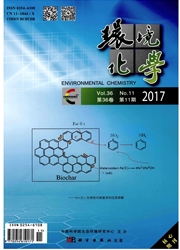

 中文摘要:
中文摘要:
应用MicroResp(TM)方法研究了4种低分子量有机酸作用下土壤微生物对不同类型碳源的代谢特征.结果表明,甲酸、草酸、柠檬酸处理下土壤微生物碳源总利用率均高于对照,苯甲酸则与对照没有差异.各有机酸之间进行比较,柠檬酸处理下土壤微生物对碳源总利用率最高,苯甲酸最低;碳源代谢的Shannon指数大小顺序为苯甲酸〉柠檬酸≈草酸〉甲酸;综合而言,柠檬酸处理下土壤微生物代谢能力最强.4种低分子量有机酸处理下,4大类碳源底物的利用率大小顺序表现为糖类〉氨基酸类〉羧酸类≈芳香族类,其中,海藻糖和γ-氨基丁酸的利用率占碳源总利用率的比例最高.主成分分析结果表明,有机酸处理下土壤微生物群落变化的敏感碳源是糖类;各有机酸处理的土壤微生物代谢特征都与对照显著不同,柠檬酸处理下碳源代谢特征与其它3种有机酸明显不同.综上所述,甲酸、草酸、柠檬酸能够提高土壤微生物碳源代谢能力,其中柠檬酸效果最好,可将添加较高浓度的柠檬酸作为提高土壤碳周转率的一种方式.
 英文摘要:
英文摘要:
The carbon source metabolic characteristics of alkaline soil microbial community under 4 types of low molecular weight organic acid treatments was investigated by means of MicroRespTM method. The results showed that formic acid, oxalic acid and citric acid enhanced total carbon utilization rate of soil microbial community in comparison with control, and total utilization of benzoic acid treatment was the not significantly different from that of control treatment. Total carbon source utilization rate of soil microbial community under citric acid treatment was the highest, and total utilization rate under benzoic acid treatment was lowest. Shannon index of carbon sources metabolism followed the order of benzoic acid treatment 〉 citric acid 〉 oxalic acid 〉 formic acid. Conclusively, metabolic function of soil microbe under citric acid treatment was to strongest. Utilization rate of carbon sources substrates followed the order of carbohydrates〉amino acids〉carboxylic acids〉aromatic group. Among 15 carbon sources, the ratio of trehalose and T-aminobutyric acid utilization rate to total carbon sources utilization rate was the highest. Principle components analysis showed that carbohydrates were the sensitive carbon source of soil microbial community changes. Metabolic characteristics of soil microbial community under 4 types of organic acid treatments were significantly different from that under control treatment. Metabolic characteristics under citric acid treatment was significantly different from that of the other organic acid treatments. In summary, formic acid, oxalic acid and citric acid could enhance carbon source metabolic ability of soil microbial community, and adding high concentration of citric acid to soil could be used as a method of improving soil carbon turnover rate.
 同期刊论文项目
同期刊论文项目
 同项目期刊论文
同项目期刊论文
 期刊信息
期刊信息
